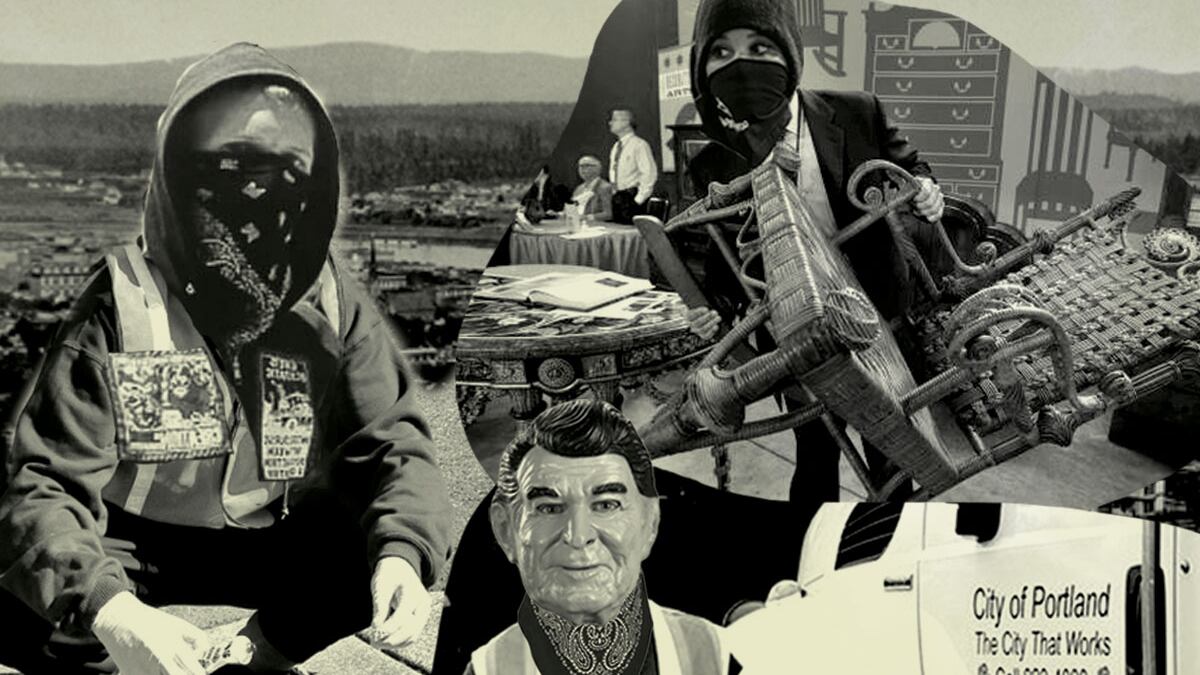Maybe you saw the photos. Members of a group calling themselves "Portland Anarchist Road Care" posing in one of our craggy streets, asphalt mix and tamping tools at the ready, with their hands in the air, birds literally and figuratively extended toward City Hall for its failure to perform basic infrastructure maintenance tasks. I know many people saw the pictures, chuckled to themselves and thought, "Only in Portland."
Here in Portland, we have a long and productive history of anarchists performing vital city functions. I know this because I myself dabbled in anarchism for a brief period in the 1980s. In the months after Walter Mondale's stunning defeat against Ronald Reagan, I remember feeling like my country had been stolen from me. The time for conventional activism was gone, and anarchism was the only thing I could think of that would allow my voice to be heard.
During my time as an anarchist, I never filled any potholes, but I participated in a number of political operations that demanded me to perform a wide range of mundane and underappreciated city services. For example, me and the other anarchists would always go out after heavy rains and wind to clear debris from storm drains. If you never had a flash flood in your part of Portland during the 1980s, there's a good chance you have me and my anarchist brethren to thank. We would also sometimes go to city parks late at night and break into the restrooms to clean them.
By far our most popular service—and the one that brought us the most recognition—was that every Saturday we would open up our meeting hall and invite our neighbors to come on down with family heirlooms, knickknacks, memorabilia, etc., and we would appraise these items, free of charge. At its peak, this event would draw 100 or more people from across the area who would wait all day for the chance of a few minutes with Mike Demonhorn, an anarchical antiques dealer. As chance would have it, a PBS producer came to one of these Saturday appraisal festivals and was so taken with the concept that he pitched it as a TV show, which went on to become the long-running TV series Antiques Roadshow.
In 1988, when the United States decided the best person to replace Reagan was none other than his second-in-command George Herbert Walker Bush, all of my greatest fears were redoubled and all of my blind optimism about Michael Dukakis was dashed against the rocks. I wondered if I had actually accomplished anything during my time as an anarchist, or if all of our sly political commentary disguised as action was for naught. I asked Demonhorn what he thought about it: "Demon, I get that by doing these things we're implicitly exposing the shortcomings of our government, and shining a light on exactly how much it doesn't do for us. But we just got signed up for four more years of bullshit. Can anyone hear us?"
Demon replied, "Mitchy, my man, this is the long con. They're doing it. We're doing it. Did you see that guy who was in here earlier with that big, bulky, wooden rocking chair? I told him it was a piece of junk, so he looked at me and asked, 'So I should just get rid of it?' But it's actually a Charles Rohlfs original. Which is really good. The Stradivarius of rocking chairs, if you really want to know." Demon nodded enthusiastically at his achievement. "Now is that going to effect change right away all by itself? No, probably not. But it's a start."

